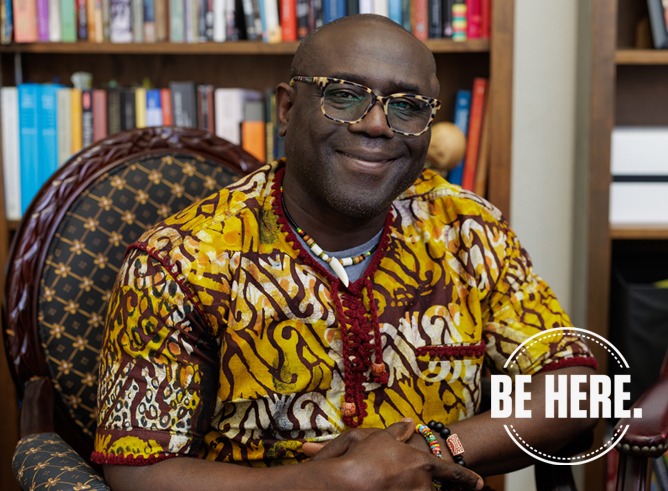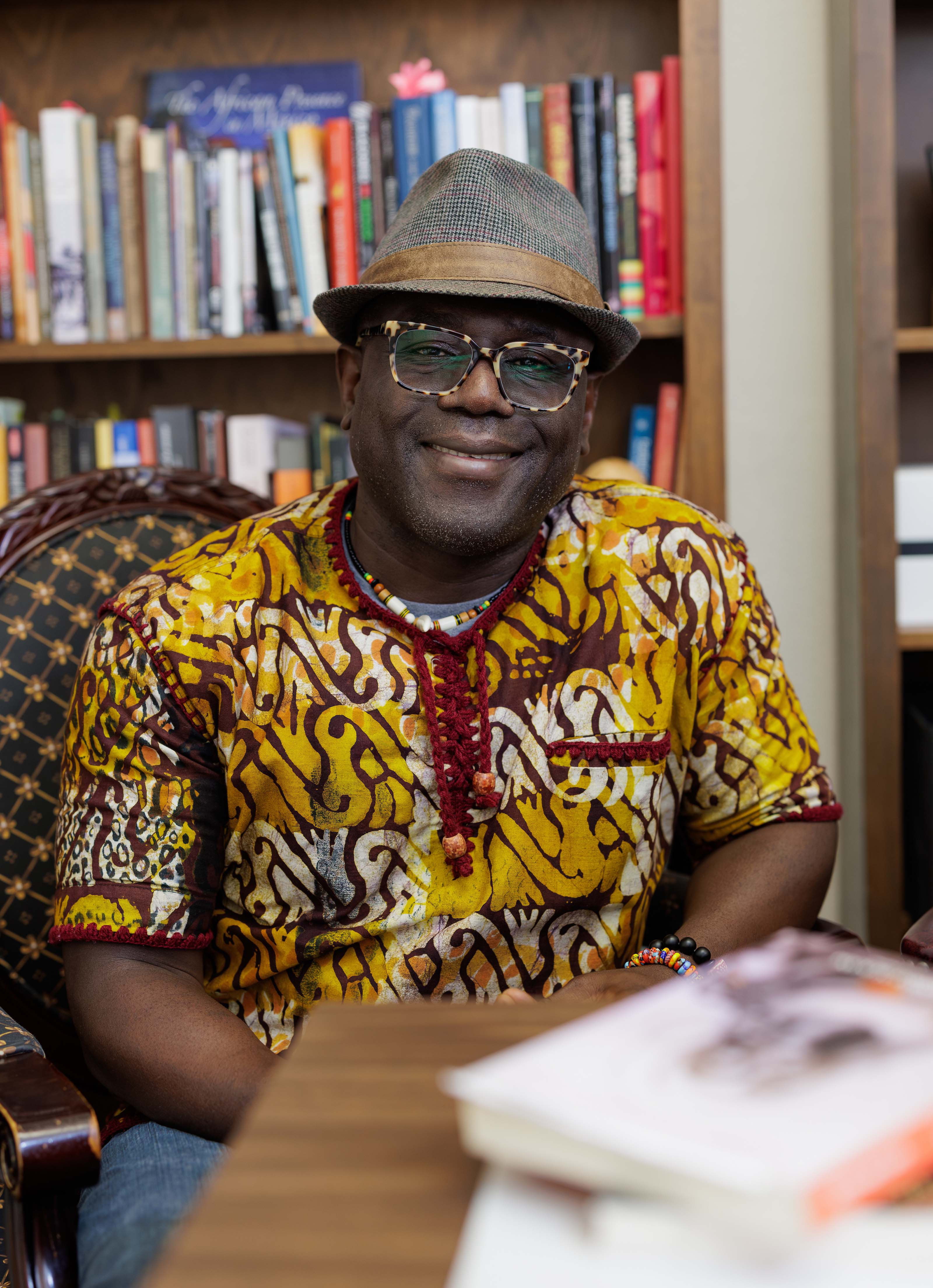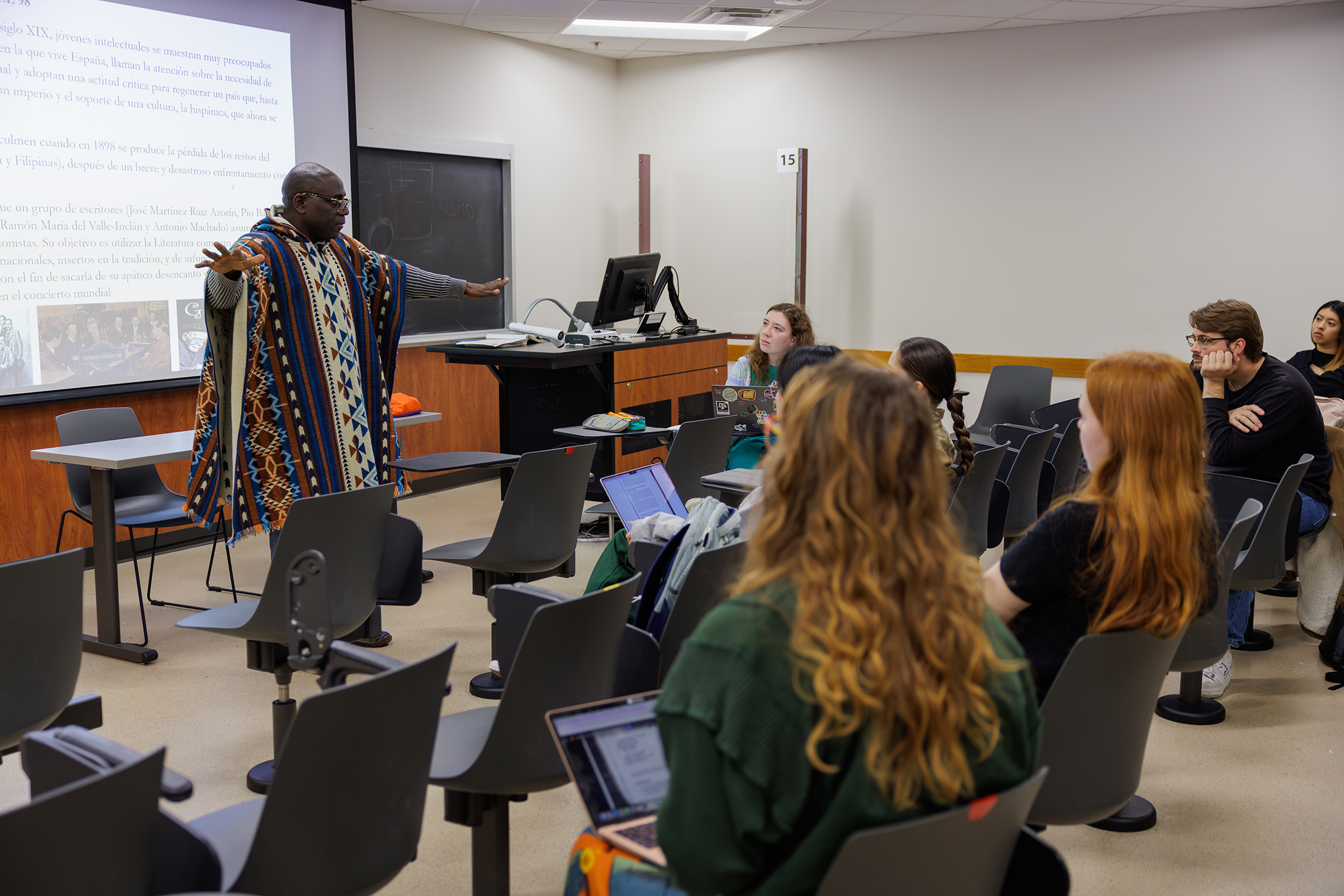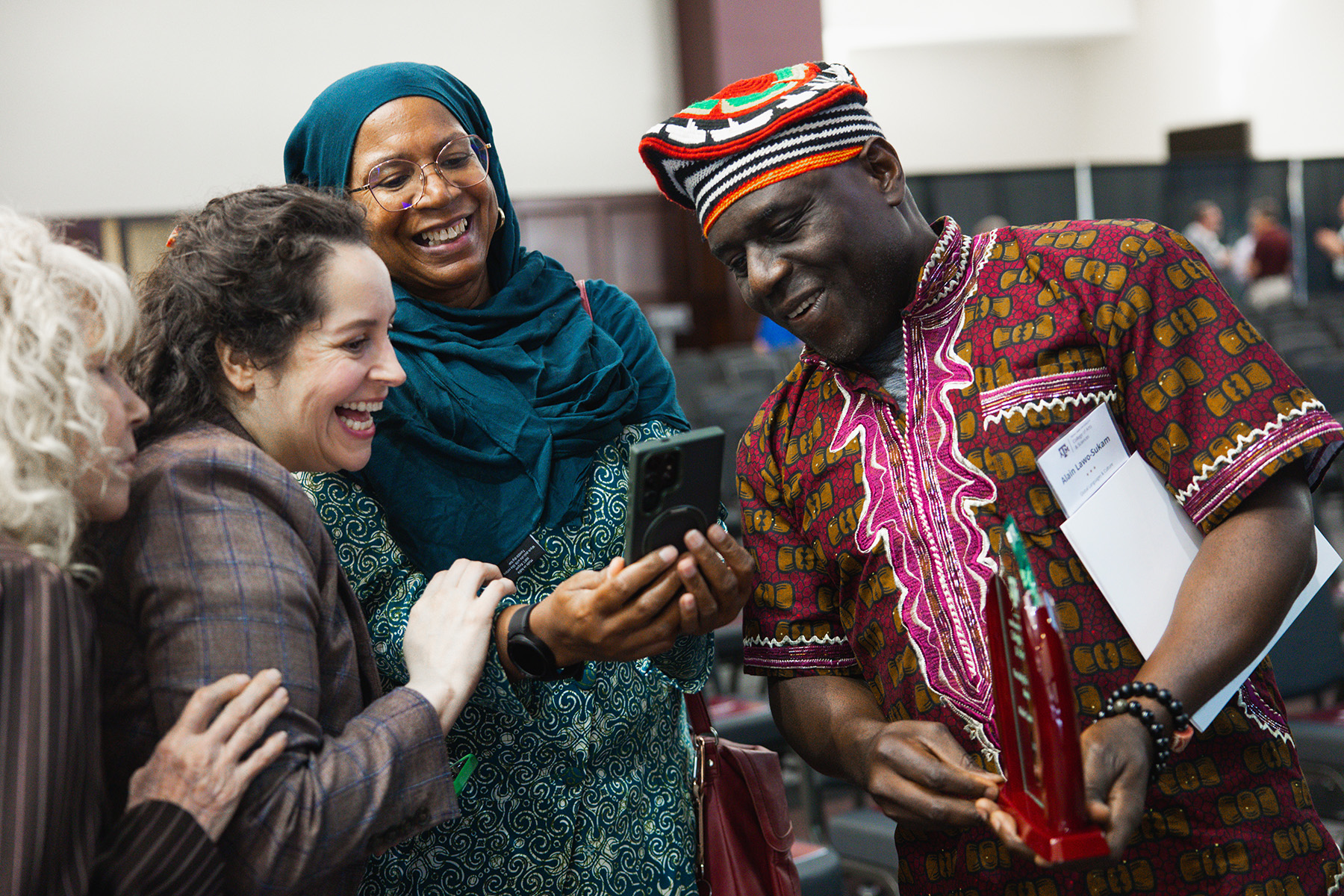
Dr. Alain Lawo-Sukam’s academic journey has left an indelible mark on literature, linguistics and cultural studies. His story is about resilience, passion and a commitment to exploring and celebrating cultural diversity.
As a professor in the Department of Global Languages and Cultures at Texas A&M University, Lawo-Sukam shares knowledge and insight with students across a wide variety of majors who are enrolled in the Africana Studies Program or seeking a minor in either Africana Studies or Hispanic Studies for Community Engagement.
Born in Cameroon, Africa, Lawo-Sukam's early years were steeped in his homeland's rich traditions and languages. His curiosity about the world beyond his immediate surroundings was sparked at an early age as he avidly read books and conversed with elders — including his mother and father — about history and folklore. This early exposure to the power of stories and diversity of human experiences set the foundation for his future endeavors.
Discovering A True Calling
Though his works are primarily written in Spanish, “I came to Spanish not by choice,” he said.
“I grew up speaking French, English and Bangwa, my native language. French and Bangwa were interchangeable in my household.”
In high school, he was given the choice of studying German, Spanish or Latin. Following in the footsteps of his older siblings, he chose German.
“Instead, Spanish was forced on me by one of my school advisers,” he said, “but after much crying, I eventually took to it.”
In Cameroon at the time, he could choose to pursue science or the humanities, “so I decided to see where this combination of Spanish and humanities studies would take me. Sometimes what we think we want to do is not what happens. I found out later this is exactly what I wanted to do — my true calling — but back then, I would never have imagined being an Afro-Hispanic scholar and professor who teaches and writes in Spanish.”

Lawo-Sukam pursued his higher education with gusto, earning multiple degrees in Hispanic studies. His academic journey took him across continents, from the University of Yaoundé I in Cameroon to the University of Illinois at Urbana-Champaign, the University of Georgia Southern and finally to Texas A&M University and its College of Arts and Sciences.
During this time, he developed a profound understanding of the intersection of language and culture.
“I’ve had to reinvent myself continually,” he said. “I knew Spanish, but I had to find my place in this discipline of Afro-Hispanic studies. I did not visit a Spanish-speaking country until I visited Spain in 2007.”
Since then, his steadfast immersion in literature and culture prepared him for a lifetime of study and travel to Spanish-speaking countries such as Spain, Argentina, Uruguay, Mexico, Puerto Rico and the Dominican Republic, among others.
He has made significant contributions to the study of African literature, particularly in Spanish- and French-speaking countries. His research delves into themes of postcolonial identity, migration and the diasporic experience, providing nuanced insights into how African narratives have evolved and continue to influence global literature. His publications, including numerous articles and influential books, are widely respected for their depth and originality.
His most recent book, the third in a series, is described as “opening a new window to the African-Hispanic literary world, thus expanding knowledge of Spanish-speaking literature in Africa.” This work, titled African Literature in Spanish from the Former Spanish Territories of Western Sahara and Morocco, “participates effectively in the awakening of international consciences about the life, identity and destiny of the Sahrawi people who were doubly colonized in their land and also exiled from it.”
Dr. Alain Lawo-Sukam
Scholarly Books
- La literatura africana en castellano de los antiguos territorios españoles del Sahara Occidental y Marruecos. Universidad del Valle Press (2023)
- La poesía de Guinea Ecuatorial en español: contexto colonial y (trans)nacional. Editorial Cuarto Propio (2019)
- Hacia una poética afro–colombiana: el caso del Pacífico. Universidad del Valle Press (2010)
Creative Writing Books
- Mange–Mil Y Sus Historias de Tierra Caliente. Editorial Eclepsidra (2017)
- Sueño Con África. Dream of Africa. Rêve d’Afrique. Viajera Editorial (2013)
Africana Studies At Texas A&M
Texas A&M’s Africana Studies Program exists to advance academic excellence, social responsibility and cultural grounding by focusing on studying people from Africa and of African descent.
“When we say academic excellence,” Lawo-Sukam said, “we mean solid faculty research and pivotal student learning. As a student-centered program, we seek a meaningful curriculum that gives students a unique opportunity to learn about the culture, history, social contributions and experiences of people of African descent worldwide.
“We aspire to provide the highest quality of teaching and research and to facilitate the development of a Texas A&M Africana community for students from all racial, religious and ethnic backgrounds.”
This is accomplished by:
- offering a variety of courses for undergraduates about Africa and its diaspora;
- exposing students to non-traditional theoretical approaches and experiences than those found in average college curriculums;
- inviting scholars within and outside of Texas A&M to share their expertise in Africana Studies and;
- providing regular cultural programming to the Texas A&M community.
Approximately a dozen students have declared an Africana Studies minor, while 15 graduate students are enrolled in the graduate certificate program.
“I believe the relatively low number of students who choose our program as a minor may be partly due to its invisibility at Texas A&M and a misconception that Africana Studies is solely for Black students,” Lawo-Sukam said. “Nothing could be further from the truth. An Africana Studies minor equips students with valuable skills and competencies for many career fields, including business, government, education, communication, performing and creative arts, and more.”

The program also fosters essential workplace skills such as analysis, critical thinking, effective communication, research and writing, collaboration, cultural awareness and diversity interaction. Furthermore, it empowers students to address crucial societal issues like equality, equity, health policy, immigration, international relations, justice and law reform. The curriculum also addresses the need that many Black students aspire to belong at Texas A&M, to learn about their heritage and to explore the Africana academic community at Texas A&M alongside students of all racial, religious, ethnic and other backgrounds.
“It’s an indispensable program, especially during this time in Texas A&M’s history when we are trying to diversify our student population and serve this population's academic and cultural needs,” Lawo-Sukam said. “Africa is the second-largest continent globally and has a sizable diasporic population globally. It is a significant and crucial part of human experience. Neither the College of Arts and Sciences nor Texas A&M can truly develop global citizenship without a solid Africana Studies program.”
I believe the relatively low number of students who choose our program as a minor may be partly due to its invisibility at Texas A&M and a misconception that Africana Studies is solely for Black students. Nothing could be further from the truth. An Africana Studies minor equips students with valuable skills and competencies for many career fields, including business, government, education, communication, performing and creative arts, and more.
Texas A&M offers more than 40 core courses under the Africana Studies umbrella, many of which are cross-listed with courses in other departments such as Anthropology, English, Communication and Journalism, Film Studies, Hispanic Studies, Performance Studies, Philosophy, Psychological and Brain Sciences, History, Political Science and Sociology. Some courses include Popular Music in the African Diaspora, African American and Afro-Hispanic Cultures and Literatures, Introduction to Hip Hop Philosophy and Rhetoric of the Civil Rights Movement.
To enhance visibility and recruit more students, the program is engaging in several activities, including:
- employing a student worker to promote the program;
- developing new courses to address contemporary challenges;
- organizing workshops such as "The Skills Mastery Series: Elevate Your Academic Journey" and "The Power of Belonging in the College of Arts and Sciences at Texas A&M University" and;
- sponsoring and co-sponsoring events such as Texas A&M’s Martin Luther King Jr. Breakfast and Black Poetry Recital.
An Empathetic Educator
Lawo-Sukam is committed to mentoring the next generation of scholars in Africana and Hispanic studies. He actively supports young researchers, guiding them through the challenges of academic life and helping them to navigate their paths to success.
He is a dedicated educator with an approachable teaching style and a genuine interest in his students' success, making him a beloved figure. Affectionately known by his students as “Professor Principe,” his classes are known for their intellectual challenge and the encouragement of critical thinking, pushing students to explore new perspectives and question preconceived notions. “You won’t pass his class unless you go to class,” is a typical student comment on professor-rating websites. He expects not only attendance but active participation.
During the 2024 spring semester, Lawo-Sukam received the College of Arts and Sciences Faculty Excellence Award, which recognizes faculty with a multifaceted career trajectory with significant impacts from multiple activities and who excel in three central pillars of academic life: research, teaching and service/leadership. A two-time recipient of The Texas A&M University System Student-Led Award for Teaching Excellence in 2010 and 2011, he also received a Texas A&M Association of Former Students College-Level Distinguished Achievement Award for Teaching in 2015.

Regan van den Elsen ’24, who graduated in May with a degree in biomedical sciences and aspires to be a mixed-practice veterinarian, took three of Lawo-Sukam’s classes, all of which were part of a minor in Spanish.
“I wanted to understand the history of Spanish culture to better communicate with my future clients of that background and because I enjoy literature,” she said. “It was also a great way to learn about cultures and understand people of different backgrounds.”
Lawo-Sukam’s emphasis on class discussion and understanding other students' perspectives was eye-opening for van den Elsen.
“His passion for these subjects makes his lectures extremely memorable, and the dedicated time we spent talking in Spanish before class plays a vital role in why we truly listened to each other during class discussions,” she said. “Even if the subject material was complex, we acknowledged that if a subject was one that a classmate was passionate about, we needed to listen.”
These classes enhanced van den Elsen’s knowledge of Spanish history and literature, giving her a greater appreciation for diversity and multicultural studies.
“Human beings are social creatures, and we tend to do better when we talk with one another,” she said. “Dr. Lawo-Sukam makes time for discussion at the beginning of every class, making it an incredibly rewarding experience.”
A Cultural Prophet
Lawo-Sukam’s contributions extend beyond the classroom and pages of a book. He is an active participant in cultural dialogues, often speaking at conferences and symposiums around the world. His ability to bridge academic scholarship with public engagement has made him a respected voice in discussions about multiculturalism, identity and the role of literature in society.
He recently presented at the Hispanic Writers and Artists Series at Barton College as well as the XV International Colloquium on Afro-Indo-Americans at The Metropolitan Autonomous University in Mexico.
Throughout his life and career, he has remained grounded in the values that inspired him: a deep respect for cultural diversity, a passion for knowledge and an unwavering belief in the power of literature to transform lives.
Human beings are social creatures, and we tend to do better when we talk with one another. Dr. Lawo-Sukam makes time for discussion at the beginning of every class, making it an incredibly rewarding experience.

